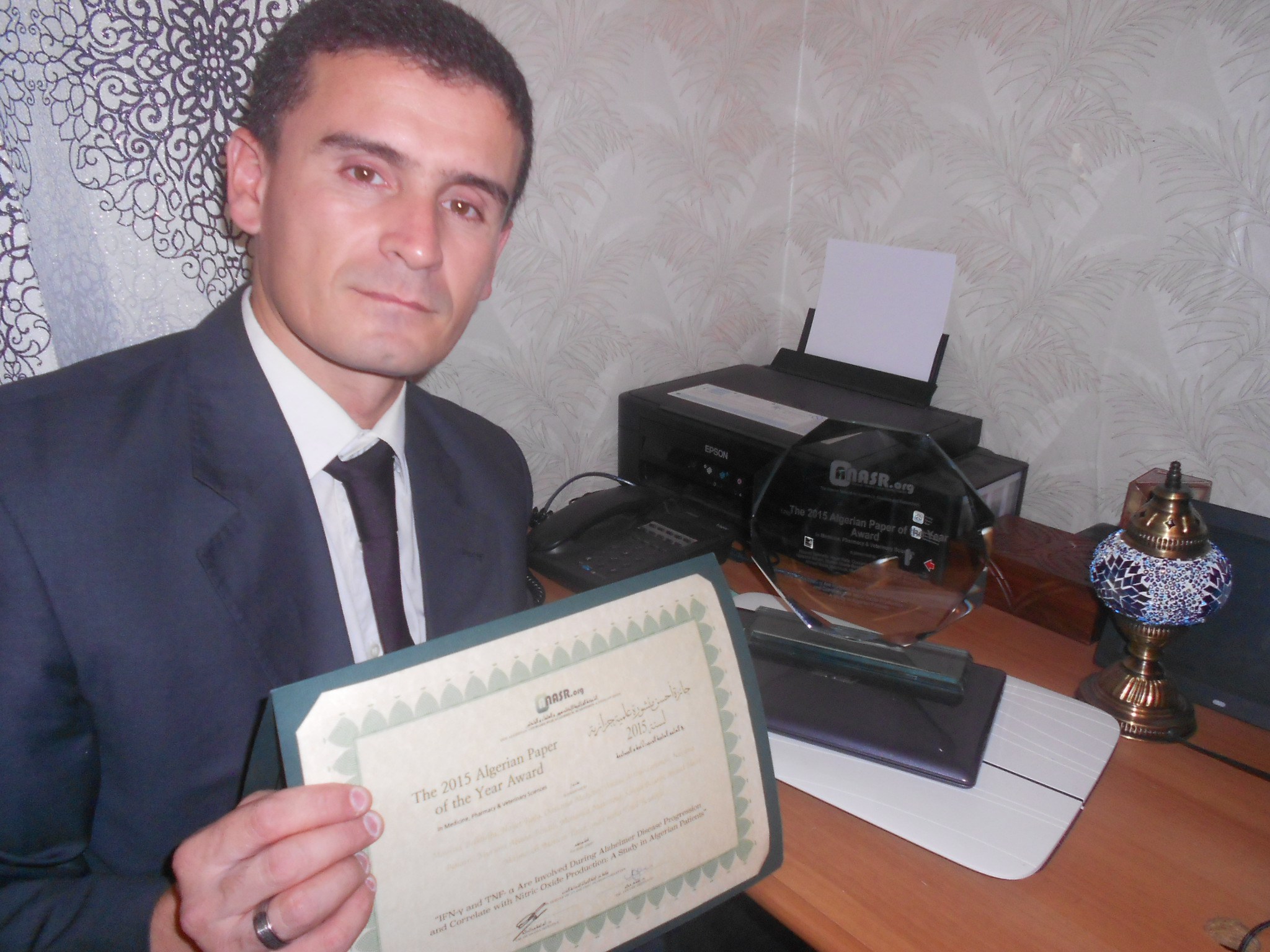Interview | Winners of the 2015 Algerian Paper of the Year Award in Medicine, Pharmacy & Veterinary Sciences
Inspire Magazine speaks with Dr Mourad Belkhelfa, a Lecturer in Biotechnology and Health in the Department of Cellular and Molecular Biology at the University of Sciences and Technology Houari Boumediene, Algiers. Dr Belkhelfa is the lead author of the paper entitled “IFN-γ and TNF-α Are Involved During Alzheimer Disease Progression and Correlate with Nitric Oxide Production: A Study in Algerian Patients”, which won the 2015 Algerian Paper of the Year Award in Medicine, Pharmacy & Veterinary Sciences.
Inspire Magazine: Thank you for speaking to Inspire Magazine, and many congratulations for winning the 2015 Algerian Paper of the Year Award in Biological Sciences. How do you feel about winning this award?
Mourad Belkhelfa: Thank you. I’m very honoured to have won this award. Selecting this paper has been a great experience that will encourage me to contribute further to the Algerian scientific output with more innovative results in my field. I congratulate you for the great initiative to create the Algerian Network for Academics, Scientists and Researchers and hope to see your initiative create a new bridge between Algerian researchers in the world. I would like to take this opportunity to thank professor Touil-Boukoffa Chafia who enabled this research to take place. I would also like to thank my co-authors. I dedicate this prestigious award to my family and in particular my wife.
IM: Can you tell us what your award winning paper is about in simple terms?
MB: The aim of the study reported in the paper is to establish the role of immune reactions in the pathogenesis and the progression of Alzheimer disease and Mild Cognitive Impairment in Algerian patients. The ultimate objective was to identify consistent and selective immuno-markers for the monitoring of AD patients. Such markers would also be beneficial in the differential diagnosis of AD and Mild Cognitive Impairment. Our results point to IFN-γ being one such marker.
IM: Why is this an important problem to address?
MB: Alzheimer’s disease is an insidious neurodegenerative disease involving the progressive and irreversible loss of certain mental functions. It presents itself in the form of memory loss and behavioral disorders. Due to its multifactorial pathogenesis, accurate diagnosis of AD and specifically the early detection of indicators for future dementia is very tricky in the preclinical stage before extensive neuronal damage. Therein lies the importance of the work reported in this paper. The identification of novel biomarkers that enable the early diagnosis of neurodegenration in preclinical subjects, will allow better control of the disease through more effective treatments at the early stages of the disease before significant irreversible neurodegeneration has taken place.
IM: What is the exact contribution(s) of the paper to your field of research and how does it compare to other approaches that exist in the literature?

Examples of the expression of immuno-markers in Alzheimer’s disease and patients with Mild Cognitive Impairment.
MB: Our study suggests that Nitric Oxide production is dependent on the induction of IFN-gamma and/or TNF-alpha during the progression of AD and is probably involved in its pathogenesis. These cytokines seem to be, in part, implicated in the NO-induced neurological damage observed in the disease. Our results confirm the significant contribution of inflammation in the development and progression of AD. Therefore, opening up a new window for the early detection, prevention of progression and treatment of such disorder through targeting the inflammatory response.
Our research draws from other work in the field, but focuses on the expression of the immuno-markers for the differential diagnosis of the various disease stages. It is also the first work of its kind to look at Ad in Algerian patients, leading this work to be cited by many researchers.
IM: What kind of support, if any, have you received to help you accomplish this work?
MB: This work was financially supported by a grant from the General Directorate for Scientific Research and Technological Development (DGRSDT), and ATRSS (Agence Thématique de Recherche en Sciences de la Santé).
IM: How did you get into this particular research and where does it fit in relation to other work conducted in your research lab or institution?
MB: Neuro-immunology has always been the focus of my research since the start of my career. My interest in this area stems from a drive to provide answers to some of the most challenging clinical questions in the Algerian population. My work started in 2000, focusing on Ataxia disease. I worked on developing a novel technique for the differential diagnosis of two neurological disorders, which exclusively prevailed in the North African population. This technique is currently employed in the Algerian University hospital Mostapha Pasha for the diagnosis of such disorders, solving real clinical issues and diagnosing rare cases. My other research interests include inflammatory diseases such as Inflammatory Bowel Diseases and Ulcerative Colitis, and colorectal cancer. My research team has published very interesting papers covering these topics.
IM: What is your take on the state of this type of research in Algeria? And how do you see it progressing in the future?
MB: Historically, basic and clinical research in Algeria has been neglected in favour of teaching and medical consultation. I think that it is very important for Algeria to change its policy in this regard, and to place research at its core. This could be achieved by creating a network of excellence with multidisciplinary researcher staff, a well-defined research policy and good financial support.
IM: Thank you again for speaking to Inspire Magazine, and all the best for your future endeavours.
MB: Thank you for the great opportunity to talk about our research. I would like also to thank the staff of the Algerian Network for Academics, Scientists and Researchers and wish a long life to inspire magazine.


About the Author